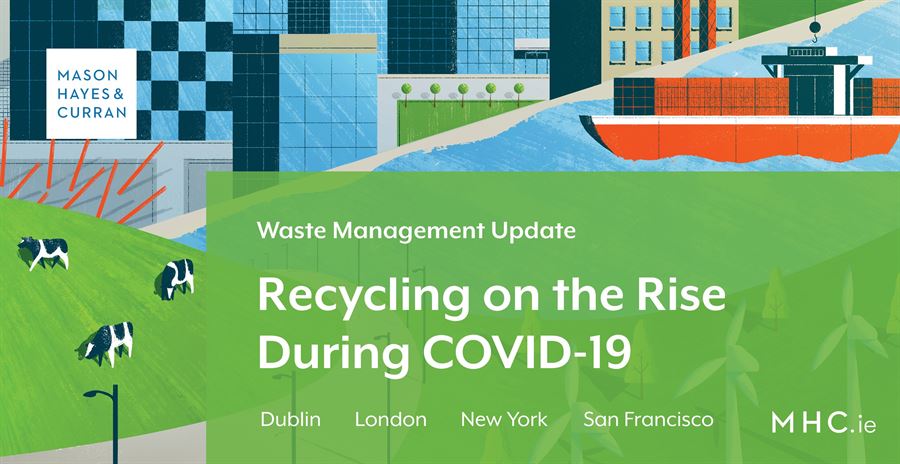
Waste collection, waste management treatment and disposal activities are listed as essential service providers under current public health guidelines. Recycling centres have remained open throughout the lockdown. We look at how regulatory state bodies can deal with the challenges arising from the recent increase in household waste produced.
Recycling and the Circular Economy
Local authorities across the country are reporting a sharp increase in business at their 1,900 bottle and can banks and 120 civic amenity sites.
'Every Can Counts', the European recycling initiative which promotes the recycling of aluminium drink cans, has reported an increase of this form of recycling in Ireland during the lockdown. Over the past four years, the Irish recycling rate for drink cans has increased by 19% to 73%.
Figures from both waste collection firms and from Repak Limited show that since the lockdown began, kerbside recycling collections have increased by 11%.
The reuse and recycling of waste in a more sustainable manner is a critical component of Ireland’s transition to a circular economy. A circular economy will ensure that the value of products, materials and resources is maintained in our economy for as long as possible, and that the generation of waste is minimised.
EU Recycling Targets
Repak Limited was established to help businesses meet their legal obligation under the European Union (Packaging) Regulations 2014 to recycle the packaging they place on the Irish market. Fees paid by these businesses to Repak fund household recycling bins, bottle banks, civic amenities and business back-door waste nationwide.
Repak has assisted Ireland in surpassing recycling and recovery targets set for it by the European Union with recycling rates announced last year as follows:
-
Plastic at 33% (EU target 22.5%)
-
Paper at 78% (EU target 60%)
-
Metals at 79% (EU target 50%)
-
Glass at 86% (EU target: 60%)
-
Wood at 95% (EU target 15%)
However a continued focus on recycling after COVID-19 will need to be sustained for Ireland to reach ambitious EU targets for recycled plastics of 50% in 2025 and 55% by 2030.
Current Challenges for Local Authorities
The increase in recycling is in part due to people spending more time at home and producing more household waste, coupled with people having more time to properly separate their waste. However local authorities and waste collectors face a number of difficulties as a result of this:
-
An oversupply of household waste during COVID-19 has resulted in a sharp increase in illegal waste activities, with Dublin City Council reporting a 25% rise in illegal dumping in the city centre alone.
-
Local authorities are presently carrying out extensive enforcement actions on individuals involved in the illegal burning of waste. Drones are being used to try to identity perpetrators. The Waste Management (Prohibition of Waste Disposal by Burning) Regulations 2009 prohibits the disposal of waste by burning, including garden waste but excluding uncontaminated waste generated by agricultural practices
-
Waste collectors must have a valid waste collection permit and therefore the public are being warned not to use unauthorised ‘Man in the Van’ type services to dispose of their waste. These services have previously been convicted of criminal offences under the Waste Management Acts, and local authorities continue to investigate and prosecute these matters during COVID-19.
-
A sharp increase in “brown bin” waste collected emanating mostly from garden and grass cuttings. Local authorities should continue to ensure compliance with the European Union (Household Food Waste and Bio-waste) Regulations 2015. This obliges waste collectors to provide a separate collection service for household food waste.
Local authorities should ensure that their waste management enforcement activities are coordinated in line with the waste priorities and objectives as set by the Waste Enforcement Regional Lead Authorities. This will allow for the consistent enforcement in waste management legislation throughout the country.
Local authorities should also engage with other state agencies such as An Garda Siochána in investigating more complex illegal waste activities. Intelligence-led and coordinated multi-agency approaches will be central to identifying problem dumping sites during COVID-19.
Conclusion
Against a backdrop of increasing environmental awareness, State bodies should continue to incentivise the recycling of waste and encourage the formation of positive habits among the general public in the months and years ahead.
Compliance with national and EU waste legislation will continue to be paramount to the success of Ireland achieving its environmental policy objectives in the Climate Action Plan. Both enforcement and educational actions by local authorities should result in favourable environmental outcomes overall.
For detailed advice on pursuing enforcement actions please contact a member of our Health & Prosecutions or Energy teams.
The content of this article is provided for information purposes only and does not constitute legal or other advice.






